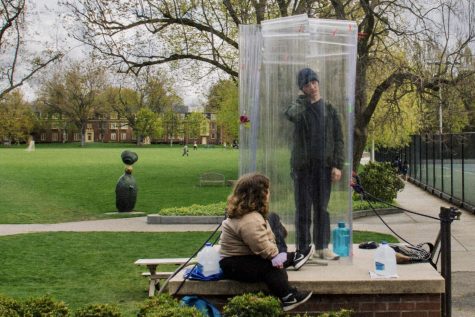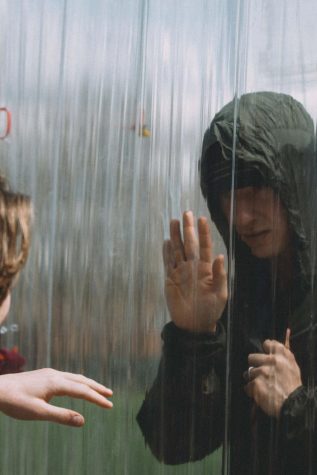Into the box
April 28, 2022

Justin Ferland didn’t expect people to care so much.
Yet on Friday night, he found himself in front of an electric crowd—at least a hundred strong—huddled by the library for what junior Willie Schack called “the event of the year.”
The countdown was booming, loud enough to be heard all around campus. At its climax, Ferland crumpled in his clear plastic box and the crowd roared. Two people rushed to lift the plexiglass temporarily housing Ferland, and as they pulled him to his feet, a new wave of cheers erupted. Ferland, leaning drowsily on seniors Micah Asuncion and Nick Young, trudged down the ramp and into the night. Spectators chattered—is he okay? Do you think he was actually in there the whole time?—and slowly dispersed to resume the ordinary goings-on of their Friday nights, leaving nothing to show for the feat but a water jug Ferland left behind.
“The whole thing is the most exciting thing that’s happened in my week,” first-year Sonia Xu said.
Ferland, a senior sociology major, thought up the project in December: he would stand upright in a clear box, without food or sleep, on one of the pillars in front of the library for 31 hours. He had chosen 31 because it’s a “totem” number for him—he was born on March 1—but 31 didn’t scare him enough, he said, so he doubled it. 62 hours: “That is a lot of time,” he thought. “That is not right. That sounds good.”
Then he learned that David Blaine, one of Ferland’s heroes, had stood for 63 hours.
So he decided on 64.
Ferland has been practicing magic since he was nine. He performs card tricks at parties, and he’s eaten glass and swallowed sewing needles for crowds—unfazed by the reactions he causes. Some people get offended, some laugh, some cry, some just think it’s stupid. “And I encourage all of it,” Ferland said. “The point is just to show something.”
He approached President Murray about the idea in January, who said, according to Ferland, that there was no structure in place preventing his stunt. He assembled a team of friends who would take turns staying with him for the 64 hours, and they began constructing the box—plexiglass and zip ties—in a Douglas study room.
Then the posters appeared. “ENTOMBED IN A VERTICAL COFFIN,” the bold print read, accompanied by a close-up of Ferland’s wide-open eyes. Between them was a picture of him standing casually, hands in pockets, looking at his feet. “WILL HE SURVIVE?”
YikYak users took the box and ran, flooding the anonymous social media app’s feed with quips like “didn’t get a single, my housing plan is now to sleep in a box in front of the library” and “today marks the last day of the B.B. (Before Box) era. Tomorrow, we enter a new age.” One post posed a Q&A with Ferland: “Q: why are you doing this? A: ???”
Ferland has answered “why” something like three hundred times, he estimates. If it’s someone who doesn’t know him who’s asking, he plays up the mystery.
“I give them some act. I’ll be like, ‘It’s just an experiment,’” he said, his voice deepening dramatically. “And it freaks them out.”
Still, the rumors abounded. Sophomore Ruthie Scherschel heard that Justin had to complete a feat thought to be impossible to become a real magician.
“I think there could be more magic involved,” Scherschel said. “But this is pretty impressive.”
For Ferland, magic is much deeper than illusions. He likes a quote that says that magicians don’t exist—they’re just actors playing a role. No one really has otherly capabilities: so what is “magic” but stretching the limits of what people think we’re capable of? The first person to run a mile in under four minutes, the first person to climb Everest: these are examples of “practical” magic Ferland gives. His magic wants to fall into the space between the possible and impossible.
He compares it to something like going to the bottom of the ocean.
“I don’t know what’s out there, but I want to explore it,” he said. “That to me is what real magic is, is that exploration.”
So on Wednesday morning, he started his voyage.
The crowd in front of the library was more scant than the one gathered on Friday night. They joked that maybe the whole thing was a social experiment and they were being secretly filmed for waking up at dawn to watch a guy get into a box.
First-year Sarah Paris was drawn to the library that morning by the absurdity of it all.
“I just think it’s really funny,” Paris said. “I saw the poster and I was like, no way. You’re joking. I actually get to witness this.”
Then someone spotted him, dressed in all black, helping a few friends carry the box with a documentary film crew in tow. They gingerly placed the structure, unpacked a collection of water bottles, and set a couple of backpacks down. They guided a long tube from the box into the adjacent bushes.
“You guys ready?” Ferland said, and the group on the grass gave some feeble whoops.
He and Micah Asuncion hugged.
“Wanna hang out on Friday night?” Ferland said.
He got in. Stood… Kept standing. The group gandered for a minute, then trickled away.
Adjustment was the first challenge. The discomfort of standing, the heat trapped in the box. The rain on Wednesday night was eventually blocked by a tarp.
Then the fatigue hit. Early in the morning on Thursday, he saw bugs crawling up and down his arms. Ferland doesn’t remember much of Thursday night, but his companions told him he started rolling around on the ground and biting at the box, trying to get out. They sat him on a folding chair, where he talked deliriously for about ninety minutes straight.
At night, there were times he was convinced the entire world was just his pillar. When sun washed over Ankeny—all at once, Ferland remembers—the world flooded back. It all felt hazy, somewhere between real and unreal.
The days were better. The conversations got him through it, he says. People would linger by the box on their way from class to talk to Ferland. Some used markers to write messages backwards on the plexiglass for him. “Go Justin!” was written in chalk on the sidewalk.
Overwhelmingly, people tried to make him more comfortable. He was gifted a scarf, several jackets, a yoga mat to stand on, a massage gun for his legs—which he says helped tremendously—and a baseball bat to lean on. Someone stuffed cash through the top of the box, which Ferland collected and flung out.
Passers-by would shoot him a “how ya doing Justin?” Those oblivious to the project before they saw Ferland would ask “how long are you in there for?” and the old favorite, “why?”
The project coincided with the presence of the Long Tent on Ankeny, and some noticed a difference in campus response between the two.
“It could have been nice to see this much support at Long Tent events,” senior Nell Falvey said, noticing the crowd on Friday night.
Junior Jaden McGinty, who was involved in the construction of the Long Tent, said he did not notice a disruption to Long Tent programming because of the box—but he saw a discrepancy in excitement.
“My main concern…is that people on campus saw his efforts and ignored the Long Tent, to a degree,” McGinty said. “And that’s not his fault. That speaks a lot more to the culture of the college.”
You couldn’t escape talk about Ferland. Everyone had an opinion: it’s exciting—nothing like this has happened here before, it’s weird—he’s peeing in a tube, it’s off-putting—I have to pass him every time I go to class, it’s pointless, it’s admirable, it’s needless suffering, it’s awesome. Ferland had become something of a public figure.
It was a weird feeling, “but at the same time, I know that they’re talking about Justin the character, not Justin the person, and for me, the separation is easy to make,” Ferland said.
Justin—the person—works as a personal trainer. He likes fashion. He made a perfume line a few years ago. He’s enamored with fragrance; friends won’t walk with him to class because he stops to smell every flower in his path.
“I could live in a garden,” Ferland said. “Next life, I’m going to be a bug and just live in a garden.”
Senior Micah Asuncion, Ferland’s close friend since their first year, describes Ferland as “mystical.”
Asuncion spent all the time he could with Ferland in front of the library.
“I just love that he’s doing what he wants to do, and he’s not doing it for anyone, but he’s doing it for himself,” Asuncion said.
Senior Bridget O’Brien, who has also known Ferland since their first year, says Ferland’s been talking about doing something like this forever, and she sees the value in it.
“I think upon initial response, it’s easy to say this is just a stupid guy doing something strange, but when you think about it a little bit harder it becomes political, it becomes more meaningful,” O’Brien said. “I think he’s exposing a lot of humanity, and it’s creating a lot of weird repulsion, or interesting responses.”
Ferland thinks that’s a function of magic.
“Good magic shows… you see the similarities in people,” he said. “You see the core of humanity; they see something so shocking or impossible that it doesn’t matter what age, race, background, gender, you know [there are] no confining barriers or identities will stop that inner curiosity, sense of wonder.”
Ferland doesn’t remember those final moments in the box. He might’ve seen figures and heard Asuncion telling him he was almost done. Maybe his name was chanted, but two days and thirty hours of sleep after the “unboxing,” it feels a bit like a dream.
And others had the same reaction, seeing the empty library pillar on Saturday. A sense of surreality surrounded the whole event: did that really happen? And, some might wonder, how did it become so big a deal? What does that say about us, as humans, as a community?
People still are puzzled by why. That might be part of the trick.
“I love this idea, especially in magic, you play with what truth is a lot,” Ferland said. “Just like how you can look at a painting and you can cry and someone else would not even notice it…I’d rather just do the thing, and have people have their own truth about it.”






Jim Jim • Apr 30, 2022 at 12:44 pm
Epic stuff